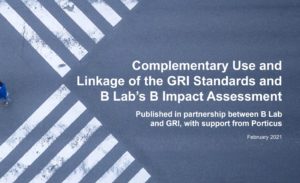
Two of the leading global enablers for environmental, social and governance impact management and disclosure have joined forces to help organizations get more out of their reporting and assessment tools. This collaboration allows companies to optimize their contribution to a more sustainable future. The GRI Standards are the world’s most widely adopted sustainability reporting standards, while B Impact Assessment (BIA), from B Lab, is a tool to help companies measure and manage their impact on their stakeholders – their workers, customers, communities, and the environment.
A new publication – Complementary Use and Linkage of the GRI Standards and BIA – enables any company to explore how the two approaches align, and how to leverage data from their GRI sustainability report with B Lab’s impact report, or vice versa.
While fulfilling different purposes, GRI reporting and B Lab’s BIA both help companies increase awareness and transparency on their impacts. Bringing these insights together can unlock a more holistic approach to how impacts are disclosed and managed.
As GRI Chief of Standards, Bastian Buck, explains: “Both GRI and B Lab share the strong belief that a deep understanding of impacts is the enabler for change. Bringing together our unique strengths can further empower companies around the world to effectively communicate how they are impacting people and planet.
Using the GRI Standards to inform the BIA will increase access to the quality data organizations need to improve their sustainability performance. Many businesses completing a BIA already use GRI for their reporting. This linkage resource will help streamline reporting requirements while encouraging action in support of sustainable business practices.”
Dan Osusky, Director of Standards at B Lab, said: “Too often organizations marching towards the same goals find themselves working in silos. By creating a linkage between B Lab’s BIA and the GRI Standards, businesses are now able to actively manage their impacts as well as report on those impacts with two best in class frameworks.
While this work is a powerful step in allowing businesses to understand and efficiently use both tools side by side, we look forward to continuing this partnership to identify further opportunities for collaboration in order to achieve our collective vision of an inclusive, equitable, and regenerative economic system.”



